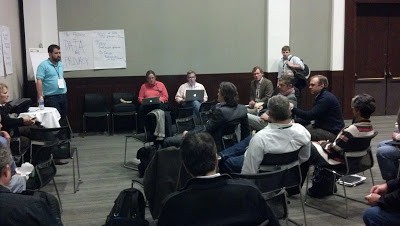 |
| Photo: Credit: Kevin Kosh |
“…your scientists were so preoccupied with whether or not they could that they didn’t stop to think if they should” – Dr. Ian Malcom in Jurassic Park
Obviously not a quote about Big Data, but a refrain that kept ringing in my head during the session “Future of Data and Privacy” with Charlotte Walker & Clark Dever
The discussion was wide ranging and many viewpoints were expressed. Too many to capture here, but the essence of discussion was around whether big data — either contained in an application, or gleaned by bots on the web — has the maturity to provide mutual benefit, or if it is the proverbial kid who found his father’s gun.
The discussion is incredibly timely with news this week that NASA lost Personally Identifiable Information (PII) on 10,000 employees and contractors, and the latest defeat of the cybersecurity bill has privacy advocates up in arms. But while the EFF is concerned about government data collection, there is a feeding frenzy over what we reveal about ourselves — or what we allow others to reveal about us — online.
2012 saw failures in over-sharing, oversight and over-the-air privacy, from Facebook data mining, to Google’s data retention, to excessive permissions of mobile apps. The premise of the conversation was the opportunity for entrepreneurs to innovate and rein in privacy issues, but the discussion quickly became a primer and a lesson on what defines identity, and the reality that in so many ways, the privacy train has left the station without a conductor.
The areas that garnered most discussion were:
Social media – why are we so permissive, and while we willingly trade information for access and convenience, how explicit is the deal we make? By corporations and even peers, sharing is reinforced. Have sites like Facebook and others gone far enough to give us the tools to choose, or in some ways have they just chosen a path to ask forgiveness instead of permission?
Global understanding of privacy – The EU has much stricter rules on privacy and more narrow definitions of identity. This is borne of and driven driven by history and catastrophic abuses of power. Conversely, the US has not experienced a catalytic event that would drive enough surge for change and thus there is an eternal struggle between business and the public interest.
Personal responsibility – how much responsibility do we as consumers bear for educating ourselves and seeking out the protections we feel our in our best interest? There were examples of tools — from TOR, to Bitcoins, to temporary credit identifiers — discussed, but few consumers know where to find them, nor do many care in a world of instant gratification. Much like healthcare, you can tell people what they need to do to lead a healthy lifestyle, but you can’t make them love broccoli.
It is a discussion that is like an iceberg, what we see is only the tip of the issue. There is no argument that Big Data – in healthcare, security, research , and even marketing — holds the promise of making the world a better place. All seemed to agree that privacy and security need to move from an add on, to a core design principle to be truly effective. And with a growing population of those whose only purpose is the abuse of people through their identity, we need to be cautious of innovation hubris and the speed with which we digitize Mt. Everest…just because we can.
Bio: Kevin Kosh, CHEN PR, long time and long suffering tech PR guy. Accomplished wiseacre. www.chenpr.com


